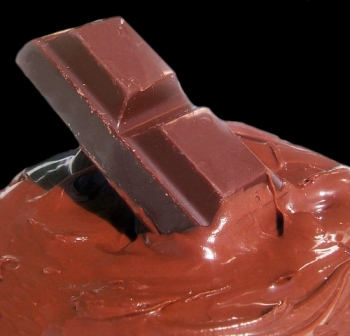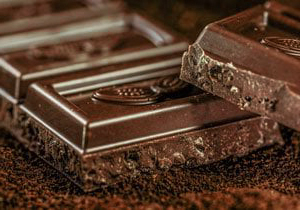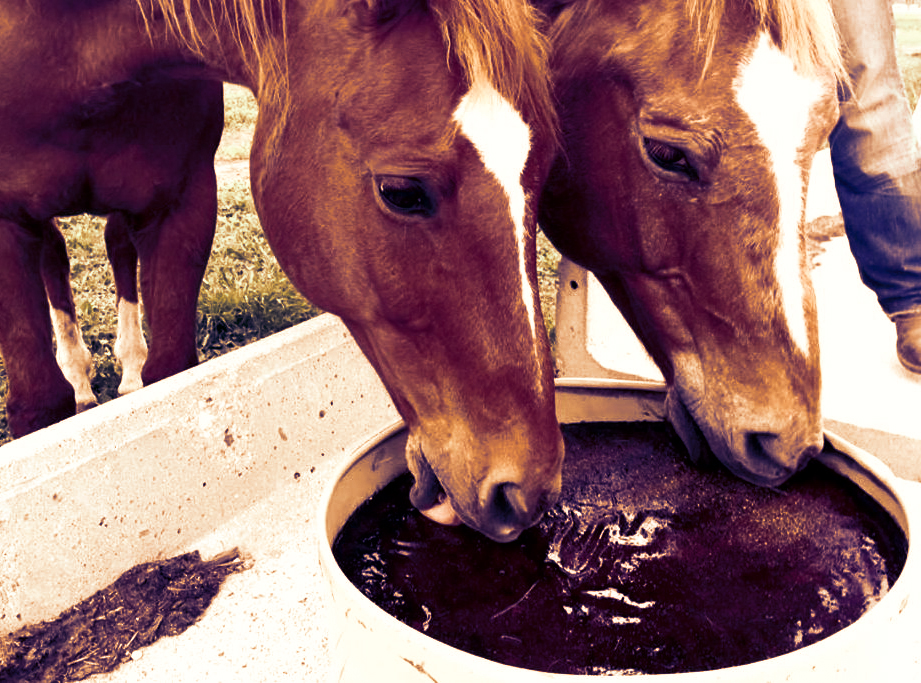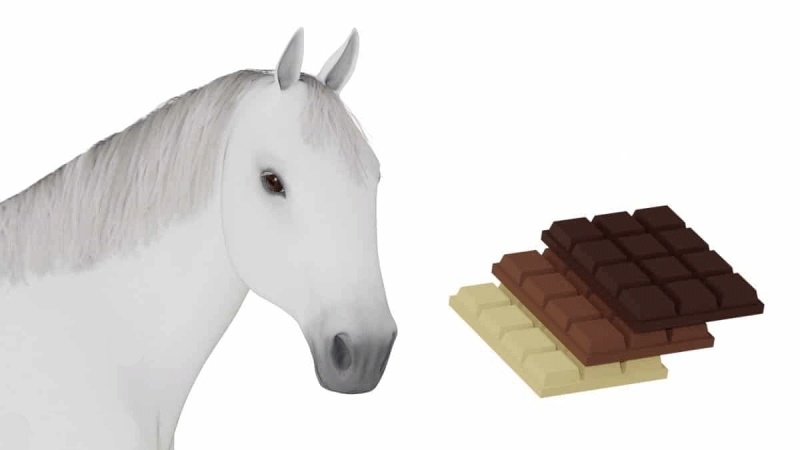
Horses Eat Chocolate Concerning treating our horse mates, we habitually wonder about the security of explicit food assortments. Chocolate, a sweetheart treat among individuals, raises issues about its sensibility for horses. With its rich flavor and captivating scent, conferring a piece of your horse is customary. The repercussions of dealing with chocolate to horses are not exactly as clear as one would think.
9 FOODS YOU SHOULD NEVER FEED TO YOUR HORSE
As horse owners, we must guarantee that we furnish our horses with excellent roughage or feeds to keep them sound. You likewise need to ensure that you’re advancing a consistent food supply by utilizing a sluggish feed roughage net and observing other fundamental guidelines to keep them in their best shape.
While we overall grasp that a sensible eating routine is key for our magnificent mates, it’s similarly phenomenal to destroy them with treats unpredictably. Different people will a large part of the time remunerate their horses by giving them human food like apples, carrots, pears, grapes, and some more.
Horses Eat Chocolate In any case, there are a few things that you should do whatever it takes not to figure out how to your horse. These can be risky and, staggeringly, disastrous expecting your horse to eat them. To provide you with some guidance, we have recorded unequivocal food blends you shouldn’t overuse if your horse eat chocolate.
1. Garlic and onions
Horses Eat Chocolate Starting with a risky subject Garlic! I have dealt with this for quite a while with no known dicey optional impacts. Incidentally, it is brilliant to be displayed on the point and organizing a pleasant Botanist is embraced.
Garlic, onions, and other indistinct food groupings, for instance, leeks, chives, and shallots contain n-propyl disulfide, which is a horrendous part for horses. N-propyl disulfide can wreck red platelets which prompts a condition known as Heinz Body Deficiency.
A survey made by Wendy Pearson in 2005 saw that “when overseen at clear levels (250 g/day for a 500 kg horse) garlic caused different changes in the horse’s blood reviewing a development for mean corpuscular volume (MCV), lessens in red platelet count and blood hemoglobin center.”
Countless you might be asking regarding for what good reason we recollect garlic for this layout, as there are horse food and treats containing garlic. Experts concerning this issue concur, that if you truly oversee garlic to your horses, it legitimizes considering running a blood assessment to ensure that their mean corpuscular volume, hemoglobin, and stuffed cell volume levels are within the typical reach.
Horses Eat Chocolate As garlic is seen as maybe of the best normal recovering substances from one side of the world to the next it contains substances that assist with uneasiness, quieting conditions along supporting equine respiratory challenges and ailments in the horses’ lungs. It values various benefits as well, so it eventually relies on the particular horse owner to research and single out the distant chance that this is a respectable improvement to your horse’s eating plan.

2. Chocolate
Particularly like canines and cats, you shouldn’t give chocolate to your horses, additionally. Chocolates are known to have a fixing called theobromine, which can cause seizures and inside passing. It can actuate extended beat, sensitivity, muscle shudders, and detachment of the inner parts.
Your horses can answer horrendously to these planned materials. The effect no doubt won’t be discernible when you feed them in veritable aggregates, in any case, enormous measurements can truly lead horses to disastrous outcomes.
Horses Eat Chocolate Extra unassuming segments, on the other hand, equivalently influence caffeine. It could achieve challenge horses bombarding a drug test.
3. Potatoes
horses could direct without the kind of potatoes, in any case, they could get enchanted to eat it at last. Potatoes are gigantic for the nightshade family, making them unpleasant to horses. It contains a compound called atropine, which can impact your horse’s autonomic significant design.
Horses Eat Chocolate Undesirable potatoes are more unsafe than cooked potatoes, yet potato hurting is now possible even as gnocchi, chips, or other potato-based food sources. The stems and the leaves of potato plants are what’s more unfortunate for horses.
While various horses can eat potatoes without showing any issues, various horses consistently experience gastrointestinal trouble or atropine danger. Considering this high bet, doing whatever it takes not to oversee them this dull vegetable reliably is great.
4. Tomatoes
Like potatoes, tomatoes are also basic for the nightshade family. To this end, you should never overlook it for your horses.
In this manner has atropine that can cause colic, increase beat, stop up, and decline spit levels. The green bits of a tomato plant other than contain an alkaloid that can slowly obliterate the breaking point. Horses overall could manage without tomatoes’ taste, yet as a vigilant step, plant your tomatoes in a protected locale, away from them.
5. Meat
We all around fathom that horses are herbivores, meaning their stomach-related structures do not attempt to eat meat. Carnivores have pointed teeth that help them with eating meat, while herbivores like horses have level teeth expected for gnawing plants.
Horse stomach-related structures are similarly fundamentally more phenomenal than went of meat-eating animals. Their liver doesn’t have any desire to flush out the stores of meat.
There’s no evidence of the long spontaneous impacts eating meat could have. Regardless, it’s ideal to get them very distant from eating any meat-based things to avoid serious eating routine issues.
6. Bread
As horse owners, we a piece of the time get excited to give our snacks to our glorious pals. For instance, a few owners feed bread to their horses. Despite how it is there’s no shrewdness in overseeing bread, it’s not nutritious to your equines.
Bread has wheat, which is deficient in supplements A, D, and E, supplements that are crucial in a horse’s eating plan. It’s high in phosphorus, yet low in calcium. As shown by a Veterinary Right hand, “the more conspicuous degree of phosphorus restrains calcium support, further adding to calcium need.
Without enough calcium in the horse’s eating common, the horse’s body will start pulling calcium from the bones and decimating them; the more bread that is made due, the more critical the doorway this will occur.”
It’s additionally high in starch, so if your horse has a metabolic condition or insulin deterrent, it can cause laminitis< and trailblazer. A restricted total as a clashing treat ‘may’ be OK. Like anything all through standard ordinary presence, control is the key.
7. Avocado
Avocados have persin, a substance derived from unsaturated fats known to be perilous for horses. This can cause unplanned effects like colic respiratory frightfulness, edema, strange heartbeat, and neurologic brokenness. In serious cases, it could equivalently affect disaster.
All bits of the avocado, including the leaves, stems and barks are hurtful to horses. To this end, it’s fundamental to never deal with your horses in areas where avocados are made.
8. Dairy things
Horses are lactose uneven. Along these lines, as a last resort, dairy inevitable results of any kind are dishonest for them as they don’t have the genuine stomach-related motivations to hold lactose.
Eating any food with lactose could prompt serious stomach-related aggravated and runs. To this end, dairy things, for instance, milk, cheddar, and frozen yogurt should be avoided.
9. Cruciferous vegetables
Cruciferous vegetables, for instance, broccoli, cabbage, kale, and broccoli are endlessly gassy. It has a kind of sugar called raffinose, which causes disquiet and stomach-related gas in horses.
Eating a couple of cruciferous vegetables may not be undeniably unsafe for horses, yet they can encounter the slippery impacts of insane stomach tortures achieved by gas-related colic. In any case, it might be deadly if they are dealt with a ton of these vegetables.
While dealing with your horses, reliably endeavor to do your examination. If you’re at this point crude expecting a specific kind of food is Acceptable for your horses, endeavor to a veterinarian or an equine nutritionist like >Larissa Bilston from Farmalogic.
Horses Eat Chocolate Horse Cushings and Insulin Check Get-together is a stunning resource, especially expecting that you are attracted to laminitis or have a horse or pony that has EMS, Cushing’s Infection, or another metabolic issue.
Understanding the dietary necessities and limits of horses is essential for their prosperity and thriving. While giving chocolate to a horse could have all the earmarks of being harmless, it’s fundamental to plunge into current real factors and dreams incorporating this subject. We ought to examine whether chocolate is a safeguarded treat for horses and then again if it’s worked on staying away from their eating routine.

Can Horses Eat Chocolate?
Can Horses Eat Chocolate? Concerning contemplating what treats to offer a horse, various equine lovers wonder about chocolate. The unmistakable reaction is no, horses eat chocolate.
This could stun some, especially considering how chocolate is a significant part of the time seen as a harmless treat for individuals. Anyway, the physiology of horses is monstrously special, and what is acceptable for people can be horrendous to horses.
Chocolate contains theobromine, a compound that is destructive to horses in satisfactory sums. While a little piece couldn’t instantly hurt a horse, the social occasion of theobromine long term can incite serious clinical issues, including heart issues and tactile framework brokenness.
It’s indispensable to observe that horses can’t use theobromine as capably as could be expected, making even unobtrusive amounts hazardous long term

A. Overview of horse diet
Horses are magnificent creatures known for their ease, strength, and kinship. Imperative to their success is their eating routine, which mainly contains scrounges like roughage and grass, upgraded by grains and a portion of the time treats. Understanding what horses can and can’t gobble is vital for staying aware of their prosperity and centrality.
B. Introduction to chocolate and its potential risks for horses
While chocolate is a superb treat for individuals, it threatens our equine colleagues. Chocolate contains theobromine and caffeine, which are harmful to horses. Without a doubt, even in restricted amounts, chocolate ingestion can provoke different clinical issues, making it essential for horse owners to be cautious about getting this treat a long way from their animals.
Understanding Chocolate Destructiveness in Horses
A. Components of chocolate perilous to horses
Theobromine and caffeine are the fundamental wrongdoers in chocolate hurtfulness for horses. These blends can cause threatening reactions going from delicate gastrointestinal stunner to extra serious neurological and heart issues.
B. Effects of chocolate ingestion on horse health
Exactly when horses eat chocolate, the theobromine and caffeine can quickly enter their course framework, provoking extended beat, fomentation, shudders, and perhaps deadly seizures. Besides, chocolate can cause gastrointestinal wretchedness, including spewing and detachment of the entrails, further compromising the horse’s success.
Factors Influencing Chocolate Toxicity
A. Quantity of chocolate consumed
The earnestness of chocolate harmfulness in horses is compared with the total ingested. For sure, even little measures of chocolate can incite antagonistic effects, so any usage should be immediately tended to.
B. Type of chocolate
Different kinds of chocolate contain fluctuating levels of theobromine and caffeine. Faint chocolate and cocoa powder have higher assemblies of these blends diverged from milk chocolate, making them more dangerous for horses.
C. Size and age of the horse
More unassuming horses and foals are all the more exposed to chocolate hurtfulness because of their lower body weight and absorption. For sure, even a restricted amount of chocolate can influence their prosperity.
D. Individual sensitivity
Especially like individuals, horses could have moving degrees of hatred for chocolate. A couple of horses could show serious secondary effects even with irrelevant transparency, while others could show milder reactions.
Signs and Symptoms of Chocolate Hurting in Horses
A. Immediate symptoms
Horses Eat Chocolate: Signs of chocolate hurting in horses can show rapidly and consolidate tension, extended beat, sweating, shudders, and inconvenience unwinding. In outrageous cases, horses could experience seizures or breakdowns.
B. Long-term effects
Whether or not the brief incidental effects subside, chocolate noxiousness can lastingly influence a horse’s prosperity. Somewhat long receptiveness to theobromine and caffeine can hurt inside organs and lead to steady clinical issues.
Treatment and Management
A. Immediate exercises upon chocolate ingestion
If a horse ingests chocolate, it is crucial to search for veterinary thought immediately. In the meantime, attempts should be made to thwart further digestion of the toxic substances by impelling heaving or coordinating started charcoal.
B. Veterinary care and treatment options
Veterinarians could manage consistent thought, for instance, intravenous fluids and drugs to address express secondary effects. Treatment will move depending upon the earnestness of the hurting and the solitary horse’s condition.
C. Preventive measures
Aversion is the ideal way to manage guarding horses from chocolate destructiveness. Horse owners should store chocolate securely away from their animals and teach others about the dangers of dealing with chocolate horses.
Can horses eat chocolate?
No, horses ought to never consume chocolate. Chocolate contains theobromine and caffeine, which are harmful to ponies and can prompt serious medical problems.
What should I do if my horses eat chocolate?
If you suspect your horses eat chocolate, contact your veterinarian quickly for directions. They might suggest actuating spewing or directing enacted charcoal to restrict the retention of the poisons.
What happens if horses eat chocolate?
If a horse ingests chocolate, it can encounter side effects of chocolate harming, including fretfulness, expanded pulse, quakes, and gastrointestinal trouble. In extreme cases, it can prompt seizures or even demise.
Conclusion
Horses Eat Chocolate: Summary of key points
Horses Eat Chocolate: Chocolate is a great treat for individuals anyway a potential danger for horses as a result of its theobromine and caffeine content. To be sure, even humble amounts can provoke serious clinical issues, making it fundamental for horse owners to be careful and proactive in preventing chocolate ingestion.
The importance of getting chocolate a long way from horses
The prosperity and success of horses should continually be a first worry for their owners. Avoiding chocolate and other harmful substances is major for staying aware of their significance and life expectancy.
B. Promoting equine prosperity and safety
By understanding the risks related to chocolate use and taking preventive measures, horse owners can add to the overall prosperity and security of their valued animals. Remember, concerning chocolate and horses, evasion is fundamental.
Read more
